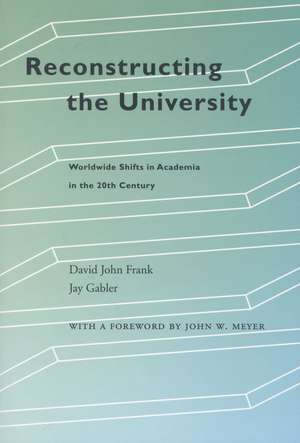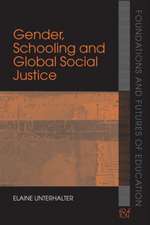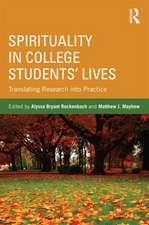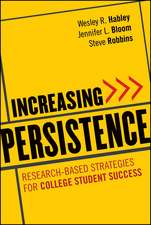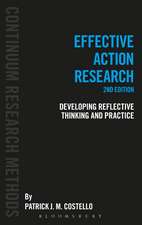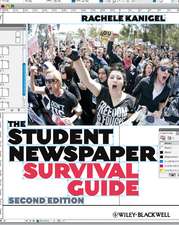Reconstructing the University: Worldwide Shifts in Academia in the 20th Century
Autor David Frank, Jay Gableren Limba Engleză Paperback – 24 iul 2006
Current conversations on the state of academia contain a broad sense of crisis over changes in the body of university knowledge—the decline of literature, the unbridling of ethnic studies, the growth of various applied programs, and so on. Much of the concern revolves around a perceived deterioration of the academic core in which, the thinking goes, the university's teaching and research priorities are increasingly compromised by external financial and political interests.
With data on faculty and course composition over the twentieth century for a global sample of universities, this book provides an examination unprecedented in scope and scale of changes in academia. The authors document the changing emphases accorded the branches of learning, the applied and basic divisions, and the disciplinary fields. They find deep transformations, as anticipated, but offer a new explanation for these shifts. Changes in academic focus are less the work of outside interest groups, but instead are cultural maps to the altering features of globally institutionalized understandings of reality.
With data on faculty and course composition over the twentieth century for a global sample of universities, this book provides an examination unprecedented in scope and scale of changes in academia. The authors document the changing emphases accorded the branches of learning, the applied and basic divisions, and the disciplinary fields. They find deep transformations, as anticipated, but offer a new explanation for these shifts. Changes in academic focus are less the work of outside interest groups, but instead are cultural maps to the altering features of globally institutionalized understandings of reality.
| Toate formatele și edițiile | Preț | Express |
|---|---|---|
| Paperback (1) | 171.63 lei 3-5 săpt. | |
| Stanford University Press – 24 iul 2006 | 171.63 lei 3-5 săpt. | |
| Hardback (1) | 645.19 lei 6-8 săpt. | |
| Stanford University Press – 24 iul 2006 | 645.19 lei 6-8 săpt. |
Preț: 171.63 lei
Nou
Puncte Express: 257
Preț estimativ în valută:
32.84€ • 34.29$ • 27.18£
32.84€ • 34.29$ • 27.18£
Carte disponibilă
Livrare economică 14-28 martie
Preluare comenzi: 021 569.72.76
Specificații
ISBN-13: 9780804753760
ISBN-10: 0804753768
Pagini: 272
Dimensiuni: 152 x 229 x 15 mm
Greutate: 0.37 kg
Ediția:1
Editura: Stanford University Press
Colecția Stanford University Press
ISBN-10: 0804753768
Pagini: 272
Dimensiuni: 152 x 229 x 15 mm
Greutate: 0.37 kg
Ediția:1
Editura: Stanford University Press
Colecția Stanford University Press
Recenzii
"This is an extraordinary, pioneering book that should become an instant classic in the field. The data set is remarkable and comparative in scope. The theoretical argument is bold but persuasive. It is rooted in modern institutional theory and shows off the power of this line of thinking. It also shatters a number of myths about the academy during the twentieth century."—Comparative Education Review
"This is gripping stuff: the claim is that, over time, universities have grown to resemble one another, in terms of how they allocate their faculty resources and thereby demonstrate dedication to upholding the various disciplines. More centrally, from Frank and Gabler's perspective, this trend is a clear manifestation of the global macro-level phenomena they see in their broadly international data."—Science and Public Policy
"I found this book absolutely engrossing and enlightening."—Review of Higher Education
"[Frank and Gabler's] contribution is remarkable for its holistic study of global higher education."—Education Review
"[Frank and Gabler's] contribution is remarkable for its holistic study of global higher education."—Education Review
"This book offers plenty of detailed information to readers who are interested in shifts among the humanities, social sciences and natural sciences... in universities all around the world."—Studies in Higher Education
"A complex work that will be of interest to scholars in many fields, as well as to any critics of higher education who wish to embrace a more thoughtful view of the reasons behind curriculum change than some we have seen in the past."—College and Research Libraries
"This is a fine book, designed for any course dealing with higher education."—CHOICE
"Reconstructing the University is one of the most interesting books on changes in higher education that I have come across. By sampling university course catalogues from countries in Europe and the Americas to those in the Middle and Far East, Africa and Oceania, Frank and Gabler are able to map broad convergences in the fate of the humanities, social sciences and sciences over the course of the 20th century. The changes they demonstrate—especially, the phenomenal rise of the social sciences—suggest that it is more than plausible to think of universities as constituents of a worldwide republic of learning."—Gerhard Casper, President Emeritus, Stanford University
"The broad sweep of this study, both chronologically and geographically, is unprecedented in this area of research. The general pattern of findings—expanding social sciences, declining humanities, steady natural sciences throughout the world—and the specific findings for particular disciplines will be eye-opening for many specialists and professionals. This is a landmark study of the structure of organized knowledge."—John Boli, Emory University
"This is a fine book, designed for any course dealing with higher education."—CHOICE
"Reconstructing the University is one of the most interesting books on changes in higher education that I have come across. By sampling university course catalogues from countries in Europe and the Americas to those in the Middle and Far East, Africa and Oceania, Frank and Gabler are able to map broad convergences in the fate of the humanities, social sciences and sciences over the course of the 20th century. The changes they demonstrate—especially, the phenomenal rise of the social sciences—suggest that it is more than plausible to think of universities as constituents of a worldwide republic of learning."—Gerhard Casper, President Emeritus, Stanford University
"The broad sweep of this study, both chronologically and geographically, is unprecedented in this area of research. The general pattern of findings—expanding social sciences, declining humanities, steady natural sciences throughout the world—and the specific findings for particular disciplines will be eye-opening for many specialists and professionals. This is a landmark study of the structure of organized knowledge."—John Boli, Emory University
Notă biografică
David John Frank is Associate Professor of Sociology and, by courtesy, Education at the University of California, Irvine. Jay Gabler is a Ph.D. candidate in sociology at Harvard University.
Textul de pe ultima copertă
“Reconstructing the University is one of the most interesting books on changes in higher education that I have come across. By sampling university course catalogues from countries in Europe and the Americas to those in the Middle and Far East, Africa and Oceania, Frank and Gabler are able to map broad convergences in the fate of the humanities, social sciences and sciences over the course of the 20th century. The changes they demonstrate—especially, the phenomenal rise of the social sciences—suggest that it is more than plausible to think of universities as constituents of a worldwide republic of learning.”—Gerhard Casper, President Emeritus, Stanford University
“The broad sweep of this study, both chronologically and geographically, is unprecedented in this area of research. The general pattern of findings—expanding social sciences, declining humanities, steady natural sciences throughout the world—and the specific findings for particular disciplines will be eye-opening for many specialists and professionals. This is a landmark study of the structure of organized knowledge.”—John Boli, Emory University
“The broad sweep of this study, both chronologically and geographically, is unprecedented in this area of research. The general pattern of findings—expanding social sciences, declining humanities, steady natural sciences throughout the world—and the specific findings for particular disciplines will be eye-opening for many specialists and professionals. This is a landmark study of the structure of organized knowledge.”—John Boli, Emory University
Descriere
Detailed study of transformations in the teaching and research priorities of universities worldwide, examining how these changes correspond to globally institutionalized understandings of reality.
